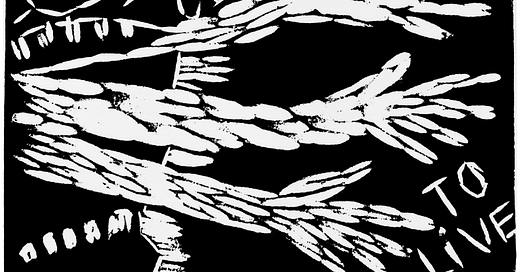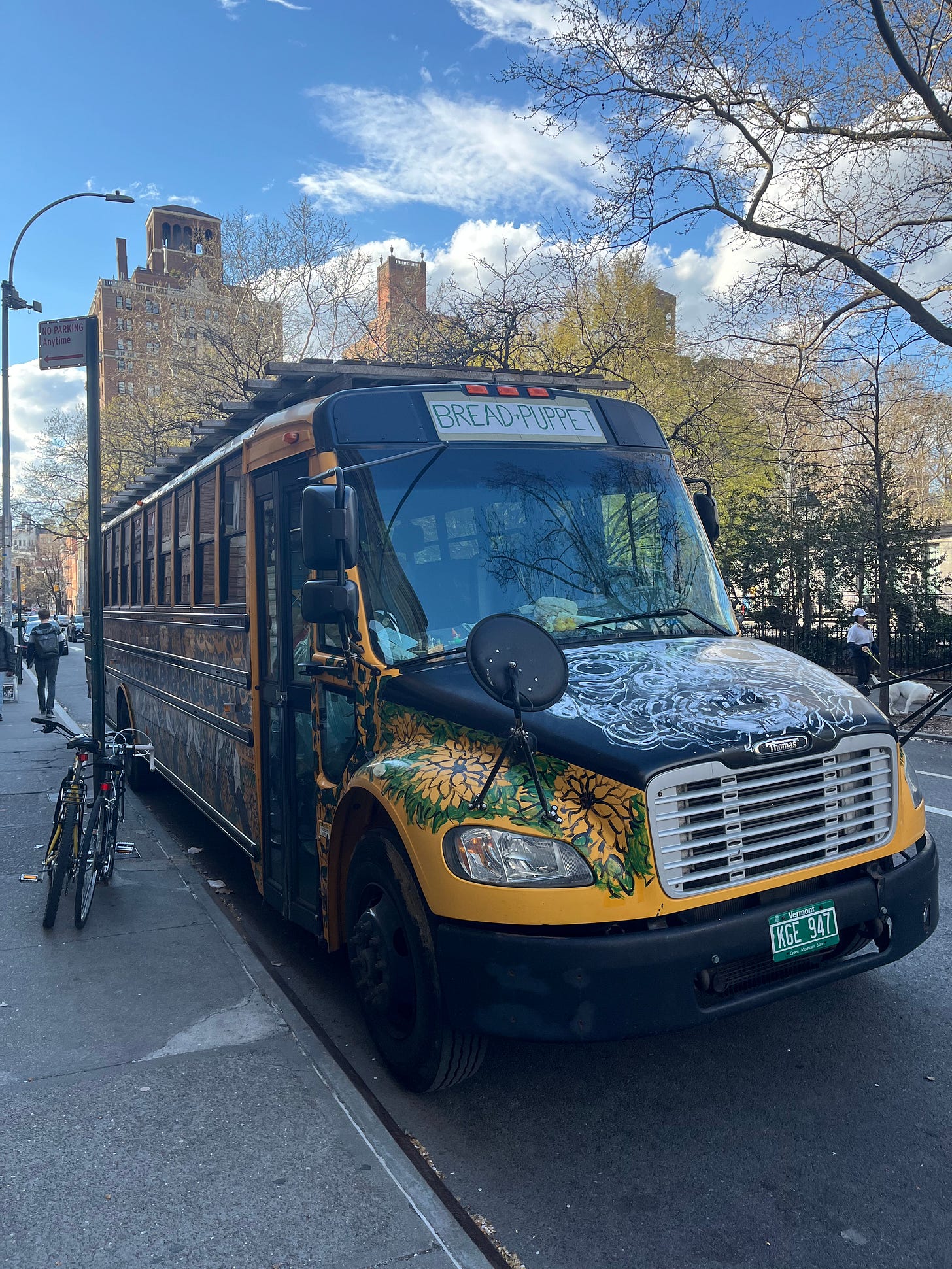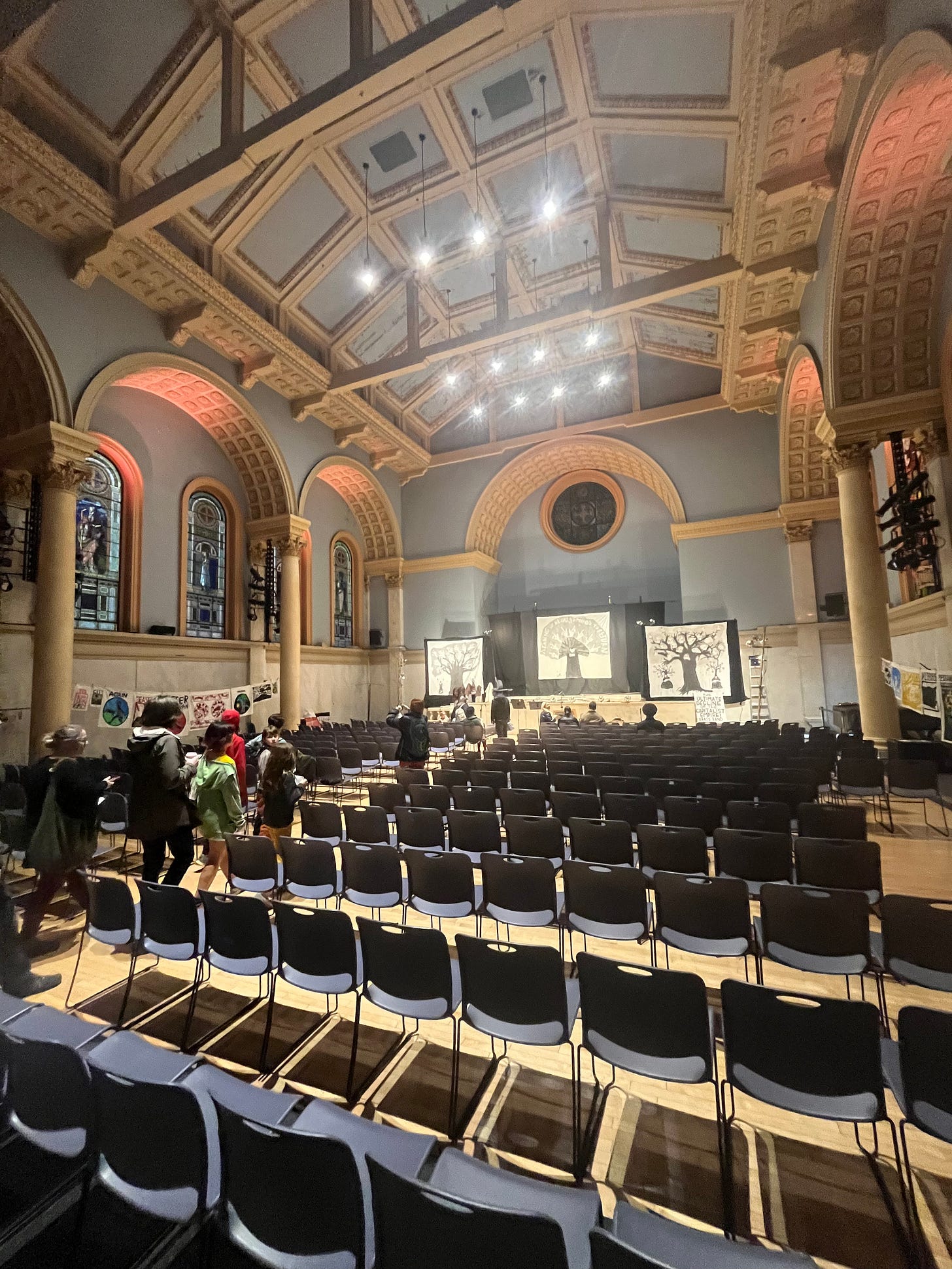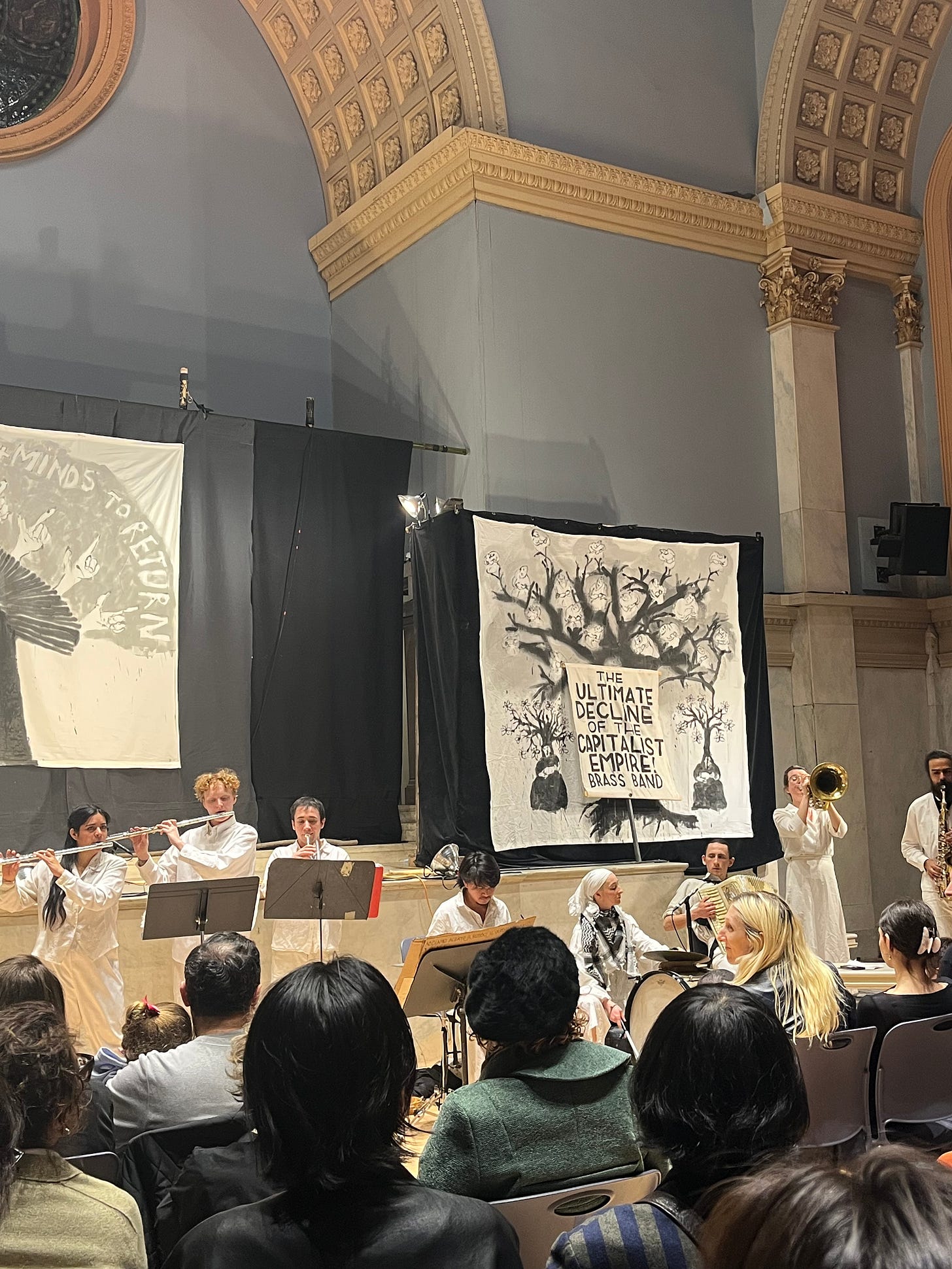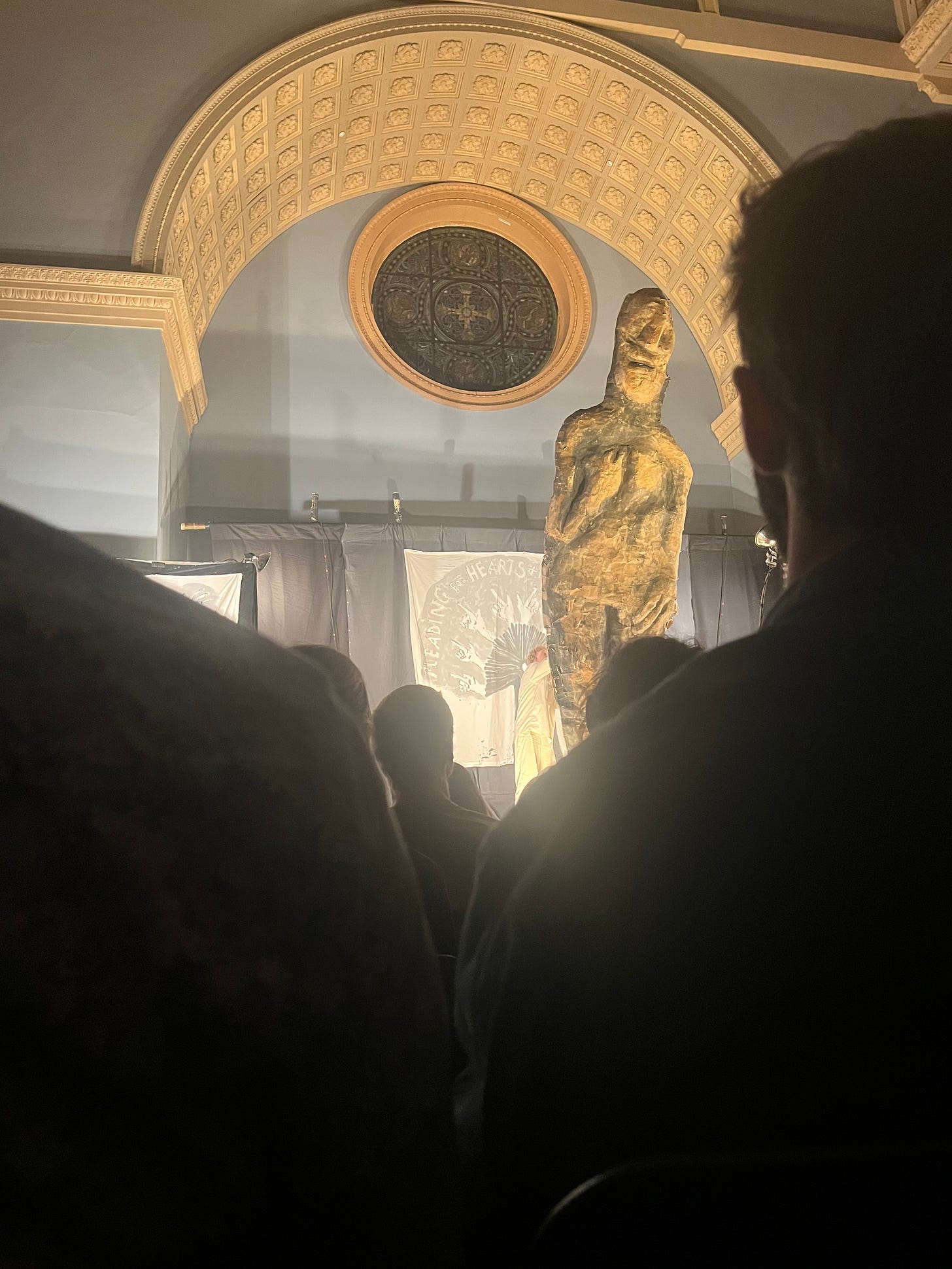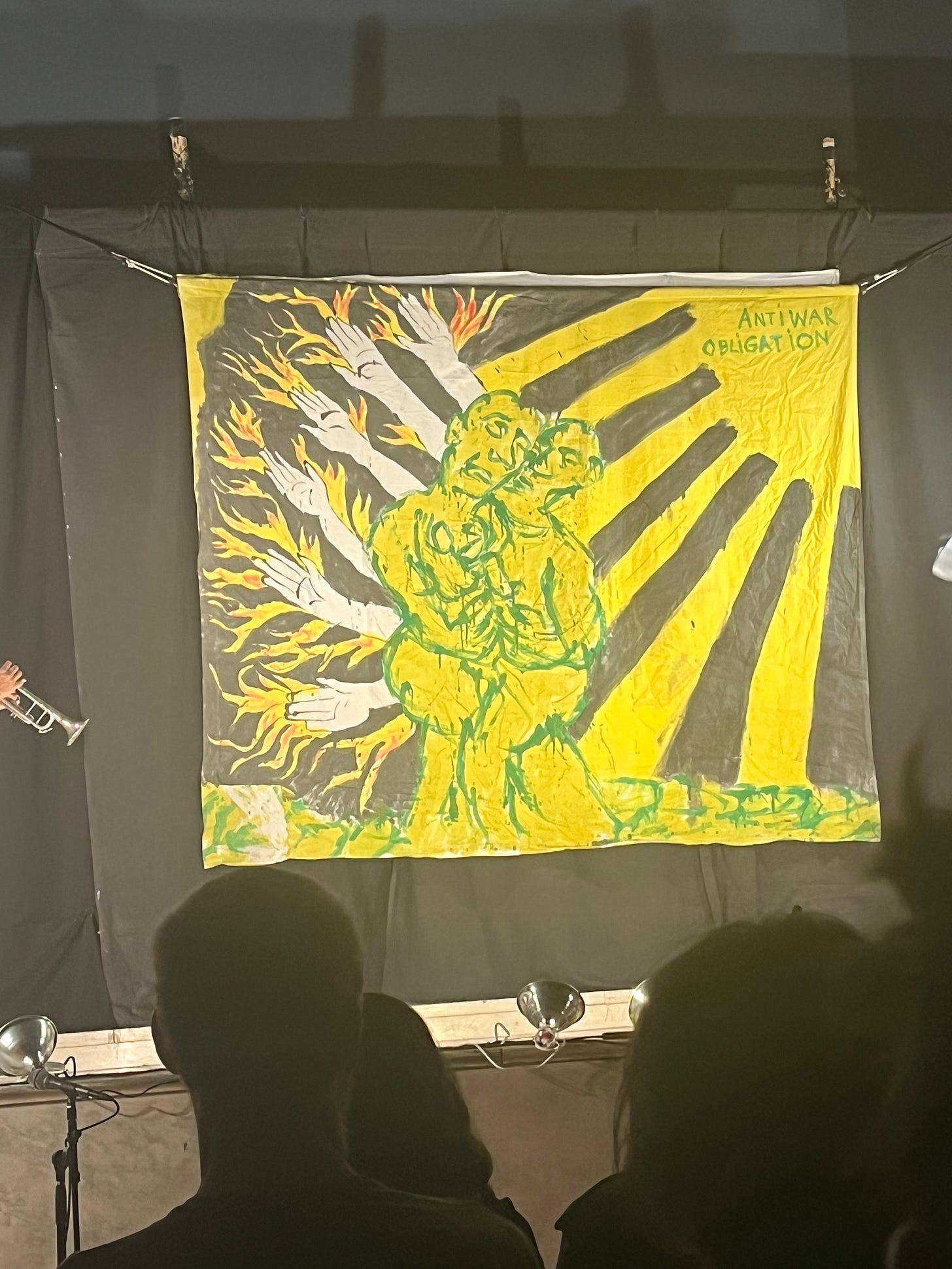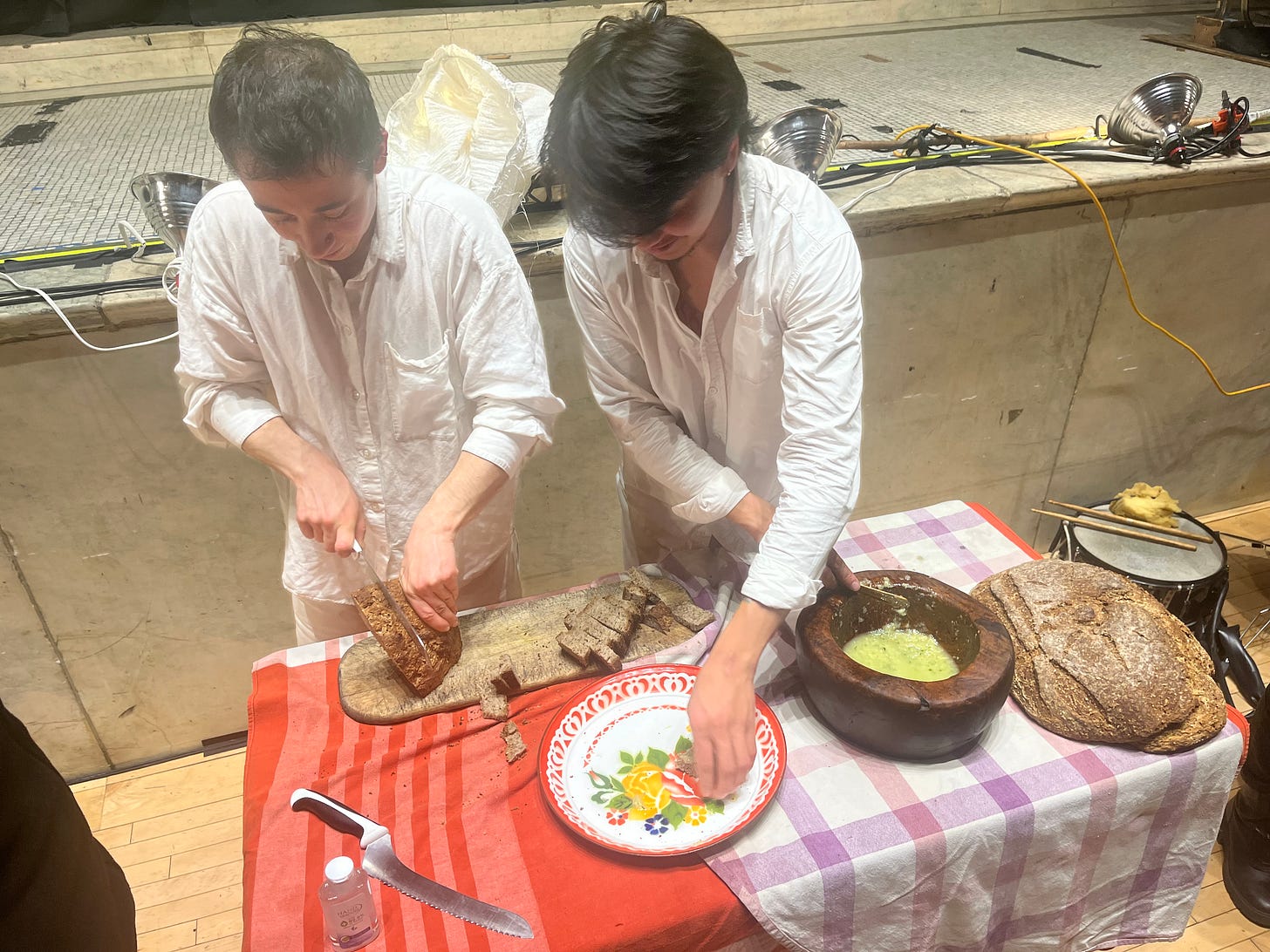Tuesday 22nd April
the 79th etude - a text about Bread And Puppet's " The Obligation to Live "
Hello everyone!
Over the coming months I’ll be sharing some research I’ve been doing for my DYCP. I won’t go into too much detail for now as that’s for another post thats been drafted up but I wanted to take this moment to share a show I saw whilst on a recent trip to New York. It speaks to the research in a way that feels holistic.
I hope you enjoy the text.
Bread and Puppet - The Obligation to Live.
I’ve always wanted to visit the Judson Memorial Church. During lockdown, I rwatched archival footage of Bill T Jones and Trajal Harrell presenting pieces on the famed meeting room floor. Each piece, exploring aids in NYC or more abstract ideas of choreography, sitting in dialogue with a space used for praise and worship.
Before visiting the Judson, I often assumed it was a deconsecrated church, that it was now primarily used as a theatre. Whilst running through things to do in the city on a Tuesday night, I was caught off guard that it still hosts prayer services and a Sunday school. It’s active in the dialogue with a place of worship and the art works presented there. This isn’t like any other church though. Draped from the rails outside are flags in support of Black Lives Matters and Trans Rights. When introducing the space, Andy who is the Sunday School director describes the Judson as a church that doesn’t know how to be a church. Exploring deeper you see that they have resident art curators and how during the 60’s, experimental artists were invited to rehearse in the meeting room hall, kicking off a long tradition of performance being presented there.
I tell a friend that seeing a show at Judson was proper bucket list stuff.
I hadn’t heard of Bread and Puppet before my trip. I didn’t know that they are the self-proclaimed longest running political theatre group in the US. Forming in 1963 during the counter demos in New York against the vietnam war, that they now run a farm in Vermont which seems like a communal theatre covent. I got an idea that their name was derived from the idea of “Bread and Roses” but didn’t know how literal it was, with each show ending in the company of performers handing the audience a slice of rye bread with homemade aioli. I wasn’t brought up religious but even I can make the link of this act of communion.
I tell a friend I'm seeing Bread and Puppet and they get excited for me.
I get to the Judson about 30 minutes before the doors open. For this show, you don’t book your tickets in advance. Just turn up with cash in hand. After being left to queue for 50 minutes in the rain for a gig on Friday, I thought it best to get in there early incase I have the same issue. I walk around Washington Square Park before I take my place in line. There are students sharing flyers about an upcoming protest, stickers on lamposts in solidarity with Palestine, bands playing and dogs barking. It feels like a university campus, the type you see in American teen films. There’s even a small group playing hacky sack. On a warm spring day, this feels like a hotbed.
I find the church and spot a classic yellow school bus covered in painted ivory with Bread and Puppet slapped on the hood. It’s handcrafted, different fonts telling me about the group effort to cover the bus. It feels very American to convert an old school bus into the company's tour bus, hauling giant puppets and actors across states. The queue grows round the block.
A spritely lad pops out with a giant paper mache top hat with donations written across its bright and colorful paper. He promises we’ll all be able to get in and that he's as excited as we are. No one will be turned away due to lack of cash but anything you have to hand helps. People have come prepared and throw notes into the hat. They know to arrive with cash in hand, they have their expectations. I’m going in blind.
I walk into the hallowed hall of the Judson. Banners put up by the Bread and Puppet theatre with Free Palestine, Sister Frying Pan and other political slogans sit between the columns of the church. One side there is the classic stained glass high above our heads, on the other, saints like James Baldwin, Marsha P Johnson and Octavia Butler have been adorned. Seats fill quickly as The Decline of the Capitalist Empire! Brass Band bash out the tunes. It’s hard to make out what they’re singing over the drums and tubas bellowing throughout the hall. I hear the words Palestina under the echoes as children are dancing in the front row.
The set consists of three banners, two with trees with mothers raising their hands to the sky whilst the middle one has the phrase “Pleading for the Hearts and Minds to Return”. The performance tonight is called “ The Obligation to Live”. A collage of texts ranging from The Mayan Book of the Dead, american author and activist Grace Pale. Puppets, brass bands and visual vignettes make up this declaration.
Now, I need to admit. The text was a bit dense. I was zoning in and out due to a very long few days in New York. This isn’t a complete dissection of the show but more of an attempt to document the show and the experience. I forgot names and quotes used. I just sat in the Judson immersed in the event.
On a personal aesthetic level, the show disagreed with me a little. It felt VERY AMERICAN which is hard to describe. Text repeated as someone hits a gong and the company move into another tableau. There were also a lot of moments where a performer would say something pretty profound and abstract and just stand there with an expectation that it landed with an audience. One example was when they pointed to a picture and said “ The shadow of a crying rock” which I think is a gorgeous, poetic sentence, but it just didn’t strike me the way I imagined they intended. It was then followed by a gong and a change in tableau. You could see the history of Bread and Puppet through its performance, it felt like a look into the past. It felt like a relic. Which, in the context of the show, is kinda of brilliant.
It’s hard to say I enjoyed the show, but I loved the whole wider, embodied experience with Bread and Puppet.
The show starts with a prologue where the company stands with a series of banners. They point to the pictures depicting shadows of current events. The shadows of ICE detainees, the shadow of children whose life span was too short to even have a birth certificate, the shadow of war, death, the outside world. My heart sinks. It’s an acknowledgement that our day to day sits within these shadows. I feel like we all know this, that when we go out for our little coffees or go to the pictures, we’ve spent 5 minutes on insta and heard the news of court decisions on trans bodies and the horrors of genocide, but when you immerseve yourself in escapism, the little coffee of the seat in the pictures, the flashing lights of the other side don’t ask you to consider the shadows over us. It’s exhausting to be reminded of these shadows but what can we do? It creates pessimism through overwhelming bombardment of horrors.
This is the brilliance of this piece, it starts off with a haunting, one that feels even more bleak apocalyptic being spoken to life in a church. It feels biblical.
During the performance, giant paper mache puppets loom over the audience. They have an old school aesthetic about them, reminiscent of puppets you see from pictures of protests in the 70’s or 80’s. Puppets potentially made by Bread and Puppet themselves. The scale, the church. It feels like I’m confronting a spirit. It creates a shadow over the audience. Reminding us that alongside the dark shadows, we live under the shadows of the history of resistance.
I think of Welfare State International throughout this performance. Raising the Titanic from the sea, creating operas about climate migrants. I miss them. I think about how I’ve heard stories from older theatre makers proclaiming that they learnt everything they know from John Fox and company. They feel like a relic now. An ancient text similar to those presented tonight by Bread and Puppet.
I feel like there is an intellectual optimism running through this piece. An idea that to hold your head above water, there needs to be a mixture of hope and misery and to hold both is difficult but important. That holding both is an act of resistance and to take time for both in equal measure. The shadows mentioned earlier have their opposition. The genocide the palestinan people are experiencing is being met with universal protests, of direct action to arms factories. The misery is met with hopeful acts.
It’s not to do these in spite of hope or misery. It’s an obligation to both. An obligation to live. To live under the shadows of the world. To one day, through obligation to these shadows, to live free of them. To be radical. To fight. to show solidarity. To document. To share.
The show ends with a song with lyrics claiming that there will be revolutions and then there will revolutions. This feels hopeful and miserable. It's exhausting having to fight, and demand revolutions but there’s hope in the past revolutions.
It makes me think that there will be theatre and then there will be theatre. I think of the puppets I see at Palestine marches of peace doves. Huge lanterns that feel like they’re protecting us. They reminded me of Welfare State International and now Bread and Puppet remind me of those peace doves.
After the company takes their bows, we queue up for our rye bread and aioli. There’s so much garlic in the aioli and I can feel it like a shadow in my mouth. The smell carries with me as I leave the Judson and walk back to my digs. I catch my breath, from the sites and sounds of New York and a whiff of garlic climbs up my nose. My breath stinks. But again, this feels like a shadow. I’m in America. There are shadows of shrines to capitalism hovering over me like the puppets in the theatre. I have an obligation to both of these. An obligation to be anti capitalist and fight those shadows of oppression and an obligation to the garlic in my mouth, acting as a reminder to the resistance of those old texts, the theatre companies come before me offering hope in this struggle.

